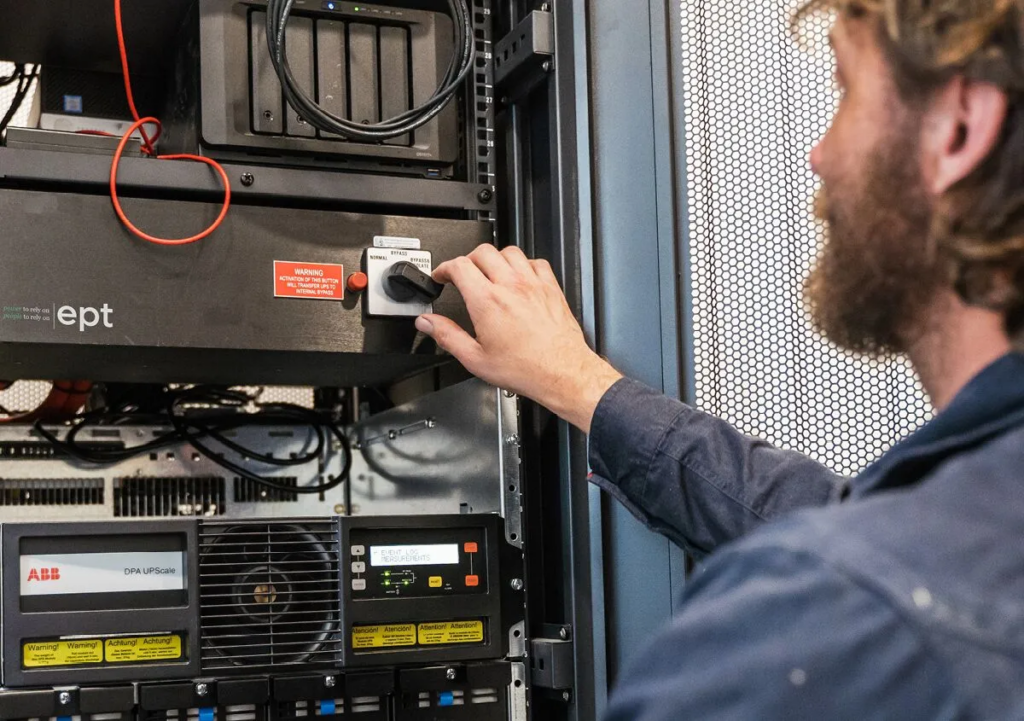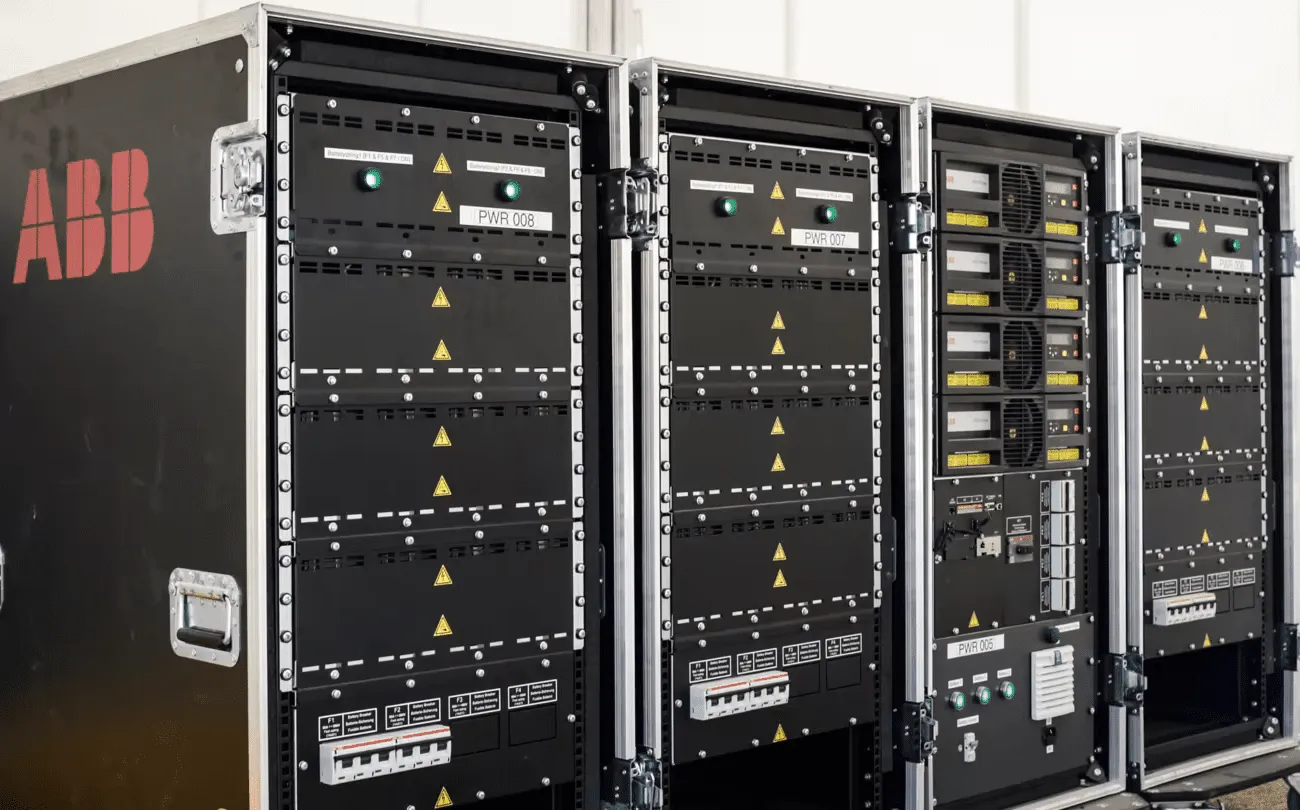Businesses depend heavily on reliable power to keep their operations running smoothly. An Uninterruptible Power Supply (UPS) system plays a critical role in ensuring power stability and protecting equipment from surges, outages, and other power-related issues.
But what exactly makes a UPS system optimised for your needs? Let’s break it down.
What Is a UPS System?
A UPS system is a backup power solution designed to maintain an uninterrupted power supply during outages or power fluctuations. It bridges the gap between the loss of primary power and the activation of backup generators or other systems.
Modern UPS systems go beyond just keeping the lights on—they protect sensitive equipment, ensure operational continuity, and minimise downtime.
Key Features of an Optimised UPS System

An optimised UPS system is more than just a reliable source of backup power. It includes several features that enhance its efficiency, functionality, and adaptability to your business’s unique needs.
1. High Efficiency
Efficiency is at the core of an optimised UPS system. Energy-efficient UPS systems reduce power loss during operation, lowering electricity costs and environmental impact. Look for systems with high energy efficiency ratings or advanced features like eco-mode for even greater savings.
2. Scalability
Businesses grow and change over time. An optimised UPS system should be scalable, allowing you to expand its capacity as your power demands increase. Modular UPS systems are particularly popular for their flexibility and ease of upgrades.
3. Reliable Battery Technology
The heart of any UPS system is its batteries. An optimised UPS should use reliable, long-lasting battery technologies like lithium-ion or VRLA (Valve-Regulated Lead-Acid) batteries. Regular battery monitoring and maintenance are essential to avoid unexpected failures.
4. Advanced Monitoring Capabilities
Modern UPS systems come equipped with intelligent monitoring and management tools. These tools provide real-time data on system performance, battery health, and potential issues, allowing proactive maintenance and minimising downtime.
5. Adaptability to Various Power Loads
A UPS system should seamlessly handle varying loads, from small IT equipment to large industrial machinery. An optimised system balances these loads efficiently, ensuring consistent performance across different scenarios.
Benefits of an Optimised UPS System
Investing in an optimised UPS system offers several advantages for businesses:
Reduced Downtime
Power outages can lead to significant downtime, costing businesses time and money. An optimised UPS system ensures a smooth transition to backup power, minimising disruptions.
Equipment Protection
Voltage fluctuations, surges, and outages can damage sensitive equipment. A high-quality UPS system provides clean, stable power to protect your valuable assets.
Cost Savings
Energy-efficient UPS systems lower operational costs by reducing power wastage. Additionally, regular monitoring and maintenance extend the lifespan of the system, reducing replacement costs.
Environmental Impact
An energy-efficient UPS system helps reduce a business’s carbon footprint, aligning with sustainability goals. Many modern systems are designed to meet stringent environmental standards.
What Makes UPS Services Critical?

To keep a UPS system running at peak performance, regular servicing is non-negotiable. Professional UPS services include installation, maintenance, and emergency support, ensuring your system remains reliable.
Regular Maintenance
Scheduled maintenance helps identify and fix potential issues before they escalate, extending the lifespan of your UPS system and improving reliability.
Expert Installation
Proper installation is vital for optimal performance. Professionals ensure that your UPS system is correctly set up and configured to meet your specific needs.
Emergency Support
In the event of a power failure or system malfunction, having access to 24/7 emergency support can be a game-changer. A reliable service provider will minimise downtime and address issues promptly.
Choosing the Right UPS System
Selecting the right UPS system for your business involves understanding your specific needs and choosing a solution tailored to those requirements.
Assess Your Power Needs
Start by analysing your power consumption and identifying critical systems that require protection. This will help determine the capacity and features needed in your UPS system.
Consider Future Growth
Choose a system that can grow with your business. Scalable solutions ensure you’re not constantly replacing or upgrading your equipment.
Work with a Trusted Provider
Partner with a reputable UPS service provider. They’ll guide you through the selection, installation, and maintenance process, ensuring your system delivers the performance and reliability you need.
UPS Systems in Perth: Meeting Local Needs
For businesses in Perth, finding a UPS system that meets the region’s specific requirements is crucial. Local service providers, like EPT, specialise in tailored solutions for a variety of industries. Their expertise in UPS installation and maintenance ensures businesses in Perth can operate without power-related disruptions.
Final Thoughts
An optimised UPS system is essential for businesses that value reliability, efficiency, and adaptability. From protecting equipment to reducing costs and environmental impact, the right UPS system offers immense value.
To maximise the benefits, invest in a solution tailored to your needs and backed by professional support services. Whether you’re upgrading an existing system or installing a new one, an optimised UPS system is a smart investment in your business’s future.





